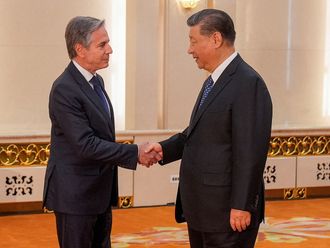Bangkok: Thai voters on Sunday overwhelmingly approved a new junta-backed constitution that lays the foundation for a civilian government influenced by the military and controlled by appointed — rather than elected — officials.
With 91 per cent of the ballots counted, 62 per cent of voters in the referendum said they approved of the new constitution, while 38 per cent rejected it, Election Commissioner Somchai Srisutthiyakorn told reporters.
The referendum was seen as a test of the popularity of the military government of Prime Minister Prayuth Chan-ocha, a retired army general who has severely curtailed dissent since coming to power in a 2014 coup. But his rule has also brought a measure of stability and ended the frequent street violence and divisive politics that had frayed Thailand’s social fabric for years.
That veneer of stability could help explain the “yes” vote for the new constitution.
In addition to asking for an opinion on the constitution, the referendum also asked a supplementary question on whether voters wanted an appointed Senate to choose a prime minister. That question elicited a less enthusiastic approval — 58 per cent “yes” and 42 per cent “no” — Somchai said.
Although no irregularities were reported in the voting process, critics are likely to point out that the “no” camp was denied the opportunity to present its case.
The junta imposed severe restrictions in the run-up to the referendum, banning political rallies, independent campaigns and open discussion about the draft constitution. Criticism of the draft was made punishable by 10 years in jail. Critics say the restrictions ensured that most people were unaware of the pitfalls of the charter, and were probably anxious to get the long-drawn process over with so that they could move on.
There was also the allure of new elections that Prayuth has promised to hold in 2017, after the approval of the new constitution, although he’s said he would call the vote even if the referendum was defeated.
Some 50 million voters were registered for Sunday’s referendum, but only about 55 per cent of them voted, Somchai said.
“If you say ‘yes’ to the constitution, it means you agree with the content of the constitution ... what makes matters worse is you also give legitimacy to the coup, to the coup makers,” said Pavin Chachavalpongpun, an associate professor at the Centre for Southeast Asian Studies of Kyoto University in Japan.
Pavin, who is Thai and a vocal critic of the junta, said a victory in the referendum would give the junta the reason to tell the world, “don’t you dare criticise us anymore because we have the legitimacy.”
The main criticisms of the draft constitution are:
— A transition period of at least five years to civilian rule.
— A 250-member appointed Senate that includes the commanders of the army and other security services.
— A deadlock in the 500-member elected lower house could trigger a selection of a prime minister who is not an elected member of parliament. Under the abolished 2007 constitution, half the Senate was elected, and the prime minister had to come from the lower house.
— Emergency decrees enacted by the junta without any parliamentary consent remain valid.
Thailand has endured 13 successful military coups and 11 attempted takeovers since it replaced an absolute monarchy with a constitutional one in 1932. This would be Thailand’s 20th constitution.
Leaders of the latest coup say frequent political conflicts had made the country ungovernable and that military rule was necessary for stability. The junta set up hand-picked committees to draft a charter that would enshrine its declared goal of reforming politics by eliminating corruption.
But others believe the new constitution has a different aim: to weaken allies of former Prime Minister Thaksin Shinawatra, the central figure in the roiling of Thai politics.
Thaksin’s political machine has easily won every national election since 2001, mainly due to the support of working-class and rural voters who benefited from his populist policies. Leading the other side is Thailand’s traditional ruling class and royalists — known as the “yellow shirts” — unnerved by Thaksin’s support, especially as it contemplates its future. King Bhumibol Adulyadej, whose righteous rule has anchored the kingdom since 1946, is 88 and ailing.
The army ousted Thaksin in a 2006 coup, after “yellow shirt” protesters took to the streets and accused him of abuse of power, corruption and disrespecting the king. He has lived abroad since 2008 to avoid prison for a corruption conviction that he says was politically motivated. The 2014 coup ousted his sister, Yingluck Shinawatra, who was elected prime minister in 2011.
Those who brought Thaksin down now seek to weaken major political parties, which would ensure that real power stays in the hands of what is dubbed the permanent bureaucracy: the military, the courts and other unelected guardians of the conservative bloc.












